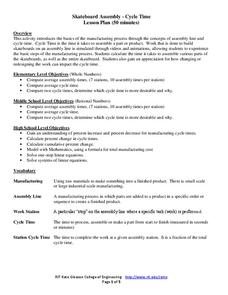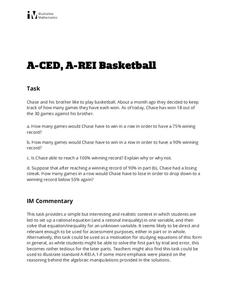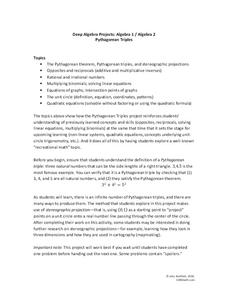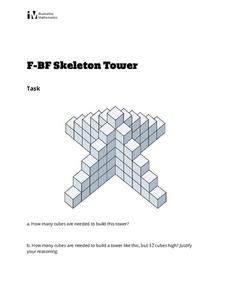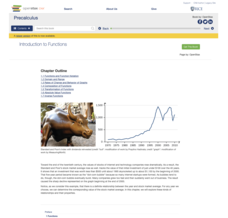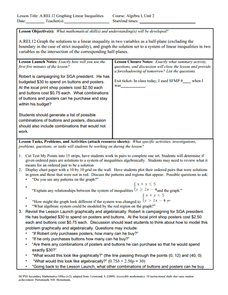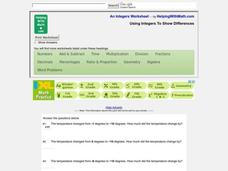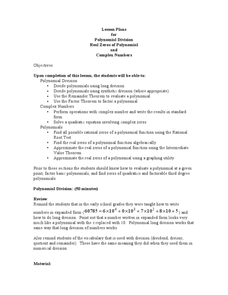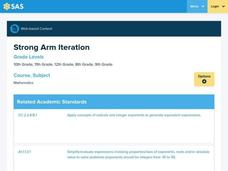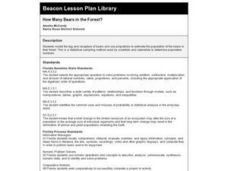Rochester Institute of Technology
Skateboard Assembly - Cycle Time
Assemble a great lesson plan on assembly lines. In the first installment of a nine-part technology/engineering series, future entrepreneurs learn about the manufacturing process, specifically about the assembly line and cycle time. The...
Curated OER
Basketball
Tap into the competitive nature of teenagers as your class practices setting up and solving rational equations. This activity starts with a specific ratio of games won to games played, then asks how many more games must be played to...
Curated OER
Building Sets of 13 and 14
Compose and decompose sets of 13 and 14 and compare sets of each with your little learners. They use objects to construct sets of 13 and 14, record their answers, and compare sets in several different ways.
Curated OER
The football and Braking Distance; Model Data with Quadratic Functions
Students use the quadratic formula to solve application problems. The first problem relates to the path of a football thrown from the top of the bleachers. Students compute the time it will take the football to reach certain heights. In...
Curated OER
Antilogarithm Worksheet
In this antilogarithm worksheet, students find the antilogarithm of 9 different rational numbers. Students use their calculator to find the antilogarithm.
Rice University
Algebra and Trigonometry
Move on into trigonometry. An informative eBook takes the content of a College Algebra course and adds more relating to trigonometry and trigonometric functions. The content organization allows pupils to build upon their learning by...
Concord Consortium
Sloppy Student II
Doesn't trying two substitutions prove it is equal? Individuals analyze a given polynomial division problem to determine whether the answer is correct. Classmates continue to determine what values to use that show the answer and the...
5280 Math
Pythagorean Triples
From Pythagorean triples to the unit circle. Learners use the Pythagorean Theorem to find Pythagorean triples and then relate their work to the unit circle in a fun algebra project. Their discovery that x^2+y^2 is always equal to one on...
Inside Mathematics
Squares and Circles
It's all about lines when going around. Pupils graph the relationship between the length of a side of a square and its perimeter. Class members explain the origin in context of the side length and perimeter. They compare the graph to the...
Curated OER
Skeleton Tower
Your algebra learners build a quadratic function in this task of counting the blocks used to build objects. The arithmetic sequence that shows up brings up a shortcut to the long addition using the Gauss Method. Eventually, learners...
Curated OER
Mathematices: Pre-Calculus
Young scholars relate polynomials to real life situations. In this algebra instructional activity, students graph equations through modeling and data collection. They must be comfortable doing word problems.
Curated OER
Love Algebra?
Eighth graders, while in the computer lab, access a web site to help them utilize manipulatives of cups and tiles to develop the skills necessary to understand multi-step equations. They assess the relationship between cups and tiles and...
Curated OER
Real Number System
Ninth graders discuss the real number system and its' properties. In this algebra lesson, 9th graders discuss rational, irrational, closure, real numbers and the distributive property of algebra. They solve problems using these...
Curated OER
Fundamental Theorem of Algebra
In this activity, learners identify the Fundamental Theorem of Algebra. They solve polynomial functions and simplify expressions and equations.
Rice University
Precalculus
Take a step beyond Algebra 2. Learners use the eBook to learn concepts from the typical Precalculus course. Content starts off with a short review of functions in general and moves on to the basic functions, finishing up with more...
Alabama Learning Exchange
Battle to the Death: Adding Integers
Young scholars explore the concept of adding integers. In this adding integers lesson, students simulate the battle of the 300 spartans at Thermopylae. Young scholars use colored game pieces to represent positive and negative numbers. ...
Curated OER
Graphing Linear Inequalities
Eighth graders extend skills for representing and solving linear equations to linear inequalities. Lesson activities build understanding and skill by plotting ordered pairs of numbers that either satisfy or do not satisfy a given...
Curated OER
Functions
Pupils explore a variety of functions. They recognize and describe functions and use linear functions to describe situations. Students find the domain and range of linear functions and graph rational expressions.
Curated OER
Using Integers to Show Differences
In this integer instructional activity, students use integers to show differences in temperatures by solving 7 short word problems. They find the differences in 7 more equations.
Curated OER
Curve Fitting and the TI-85 Calculator
Seventh graders follow a step-by-step guide for using graphing calculator to determine equations which best fit data graphed. They gather data from various sites on the web, or they do searches to find information necessary to complete...
Alabama Learning Exchange
It's Around There Somewhere! Perimeter, and Circumference
Explore the concept of building equations for perimeter and circumference. Learners use rulers to measure the perimeter of half a sheet of paper. Then fold the sheet of paper numerous times, each time measuring perimeter. Learners use...
Curated OER
Polynomial Divisions
Students factor polynomials and use long division t solve problems. In this algebra lesson, students find the zeros of polynomials by synthetic and long division. They perform operation using complex numbers.
Curated OER
Strong Arm Iteration
Students solve exponential functions and inequalities. In this algebra lesson, students find the roots of equations and use it to graph and evaluate exponential functions. They simplify exponents using the law of exponents.
Curated OER
How Many Bears in the Forest?
Third graders model the tag and recapture of bears and use proportions to estimate the population of the bears in their forest. This is a statistical sampling method used by scientists and naturalists to determine population numbers.


